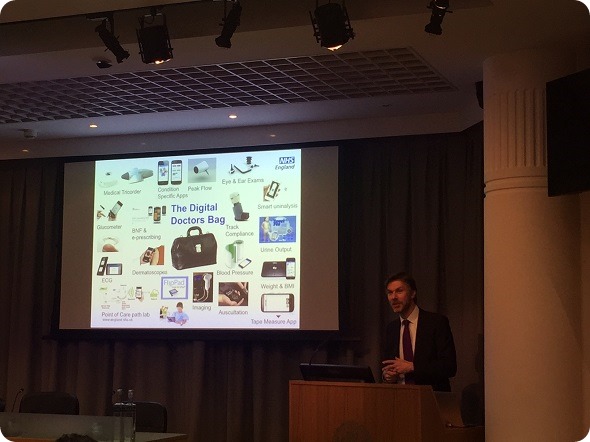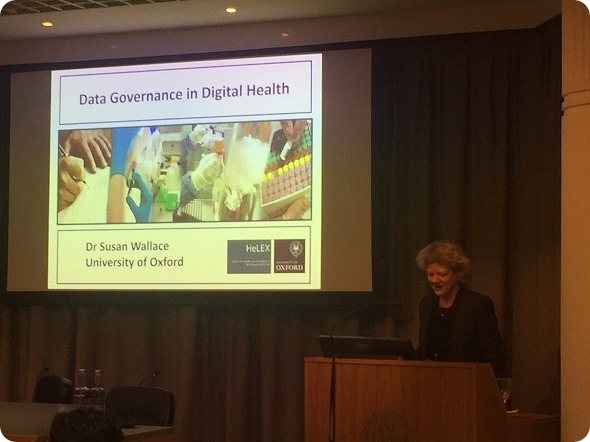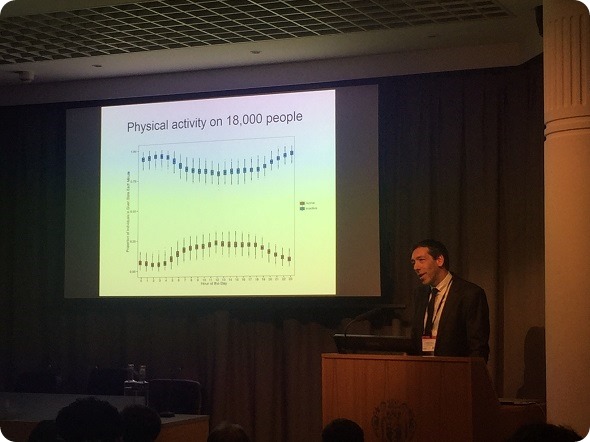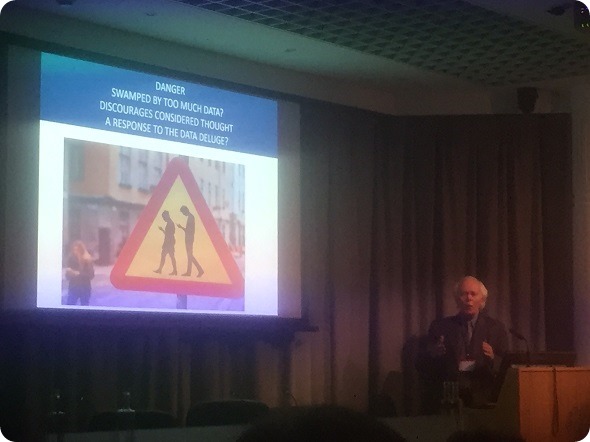"The best way to predict the future is to invent it," these were the words of Alan Kay quoted by Dr Euan Ashley at the Recent Developments in Digital Health 2016 event at the Royal Society of Medicine. No one exemplified this inspirational message further than Professor Tony Young, National Clinical Director for Innovation, NHS England.
Dr Young spoke of the lengths he went to, including remortgaging his own home, to make a difference to public health. He described how it's an amazing time to be a doctor with digital replacements becoming available for all items in the traditional doctors bag. He likened developments in digital health to the disruption caused by the printing press to traditional handwritten books, hopeful that history will repeat itself and education will be further democratised to put power in the hands of patients.

Patient empowerment was also a strong theme throughout Roz Davies' discussion of digital health. As a type 1 diabetic, Roz spoke of her first-hand experience and described caring for her chronic condition as an "endurance task". However, she highlighted the ways this knowledge and experience can be used for co-creation of digital health by incorporating the current most under-utilised resource in healthcare: patients.
Francis White, another advocate for patient empowerment, described AliveCor's mobile ECG technology, which is putting patients at the centre of healthcare by allowing them to monitor their heart rate and any potential palpitations. Not surprisingly, most of AliveCor's products are sold through Amazon to the end user, many of whom are using the device for clinical value and delivering the information to their GP.
Dr Chris Elliot, Director, Leman Micro Devices, also demonstrated a fascinating example of digital health where a blood pressure measurement can be taken in 26 seconds by pressing a finger on a phone sensor as part of a simple game to move a cloud to water a flower. Considering hypertension kills one person every 4 seconds in the world, the device certainly seems to have significant potential to impact many lives.
Game technology was also a large part of, Co-Founder and Head of Applied Artificial Intelligence Google DeepMind, Mustafa Sulleyman's talk. With no pre-programming, Google DeepMind have trained agents in hundreds of Atari games from the 70's and 80's and are currently working to develop a computer that can beat the best human player in the world at Go - an ancient Chinese game that has 10 to the power 170 possible positions on a 19x19 board.
With so many positive examples, you may wonder why digital health isn't already widespread? There are certainly some great silos, particularly in Yorkshire where there's a strong market for healthcare SMEs according to Dr Alex Gluhak, Lead Technologist at the Digital Catapult, however, there are many challenges.

Privacy was a theme that frequented the speakers' lips throughout the day. Surprisingly however, as highlighted by Dr Susan Wallace, there is no formal definition of privacy in the UK, but a lot of case law.
Privacy is clearly something Tim Ellis, NHS England, must take into account in his mission of a paper-free NHS at the point of care. Consent is a closely related topic that was discussed both by Ellis and Dr Ashley, who advised to stop treating trial participants as "subjects" and give them the power to decide which variables they are happy to share - a philosophy employed in Stanford's 'MyHeart Counts' app.

An ethical philosophy was also proposed by Dr Ameet Bakhai, Consultant Cardiologist at the Royal Free London NHS Trust, who reminded us of the 60 year old telemedicine technology of pacemakers. Dr Bakhai described the story of the engineer who first created a pacemaker after his girlfriend came home crying from hospital after a baby died from heart failure.
Personal devices were a major focus for Professor Patricia Connolly's talk, which centred on wearables. Despite the benefits, Professor Connolly outlined some barriers to real medical use including clinicians' concerns over workload and their work being monitored.
It is certainly clear that digital health will create a mountain of data, one that Professor David Patterson aptly illustrated through the metaphor of a danger sign; the listing of numerous ways he receives data and the admission that some data is still transferred via fax!

Despite all these challenges and many more, it was clear to see that digital health has great potential to revolutionise healthcare as we know it and as Martin Kelly, Co-Founder of HealthXL, stated, innovation is difficult but the people who cause the problem, aren't necessarily the ones who are going to solve it.